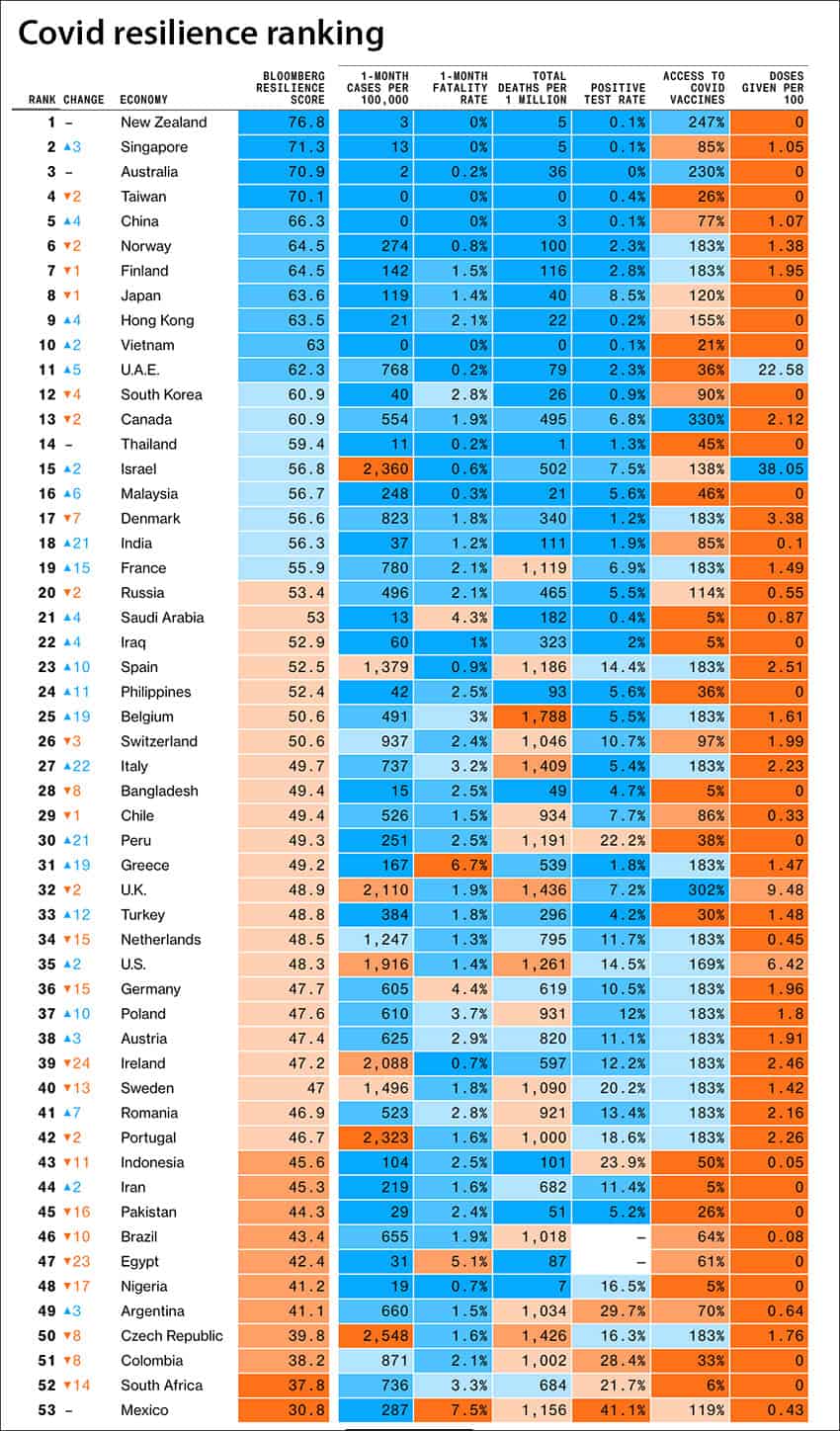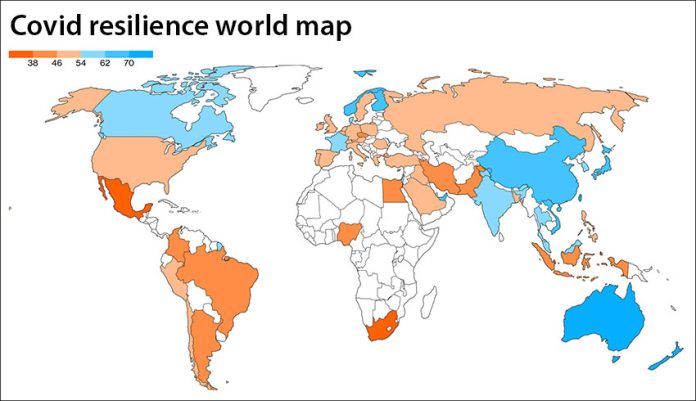Mexico remains the worst country to be in during the coronavirus pandemic, according to an updated analysis by the Bloomberg news agency.
On a monthly basis since November, Bloomberg has graded 53 countries with economies larger than US $200 billion to determine where the virus has been handled most effectively with the least amount of disruption to business and society.
It uses 10 different indicators to assess the coronavirus situation in individual countries, including growth in virus cases, the overall mortality rate, testing capabilities, the capacity of the local health system, the impact of virus-related restrictions on the economy and freedom of movement.
For its latest analysis – which was published on Monday – Bloomberg introduced an 11th indicator to evaluate each country’s progress in administering Covid-19 vaccines.
The news agency uses the various indicators to calculate a “Covid resilience” score for each country.
Mexico ranked 53rd in both the November and December analyses and maintained that unenviable position in the January assessment. Not only that, its score declined.
The Covid resilience score was just 30.8 out of 100, a decline of 6.8 points compared to November. The second worst ranked country – South Africa – achieved a score seven points above that of Mexico.
Mexico has the highest case fatality rate among the 53 countries with a rate of 7.5 deaths per 100 confirmed cases over the past month. (Mexico’s overall case fatality rate is 8.5, the highest among the 20 countries currently most affected by Covid-19, according to Johns Hopkins University.)
It also has the highest positivity rate, with 41.1% of Covid-19 tests coming back positive.
“A high rate of positive tests indicates a government is only testing the sickest patients and there’s high levels of undetected infection in the community,” Bloomberg said.
The federal government, which last year described en masse testing as useless and costly, has been widely criticized for not testing more.

Other indicators that contributed to Mexico’s score included 287 cases per 100,000 inhabitants over the past month; 1,156 Covid-19 deaths per 1 million inhabitants; 0.43 vaccine doses administered per 100 people; and a 2021 GDP growth forecast of 3.5%.
Bloomberg said that Mexico has vaccine agreements to cover 119% of Mexico’s population (just over 126 million, according to recently-released census results), but supply is currently extremely limited.
By comparison, Canada and the United Kingdom have vaccine agreements to cover more than 300% of their populations, while New Zealand and Australia have deals to cover more than twice the number of residents.
New Zealand, which has been extremely successful in controlling the coronavirus, was rated by Bloomberg as the best place to be during the pandemic with a Covid resilience score of 76.8. Singapore ranked second followed by Australia, Taiwan, China, Norway, Finland, Japan, Hong Kong and Vietnam.
Mexico’s North American trade partners, Canada and the United States, ranked 13th and 35th, respectively.
The 10 worst ranked countries were, in order, Mexico, South Africa, Colombia, Czech Republic, Argentina, Nigeria, Egypt, Brazil, Pakistan and Iran.
Bloomberg acknowledged that some countries have started inoculating citizens against Covid-19 but said “the biggest global vaccination campaign in living memory has yet to reach a point where it’s causing meaningful shifts in … [the] Covid resilience ranking.”
“How quickly vaccinations can bring down fatalities and how effective they’ll be against new, fast-spreading variants will be the key focus into February, when we’ll update the Covid resilience ranking again,” the news agency said.
Noting the poor performance of the United States, Brazil and Mexico in combating the pandemic, Bloomberg said that former U.S. president Donald Trump, Jair Bolsonaro of Brazil and President López Obrador – who announced Sunday that he had tested positive for Covid-19 – all “repeatedly downplayed the coronavirus threat.”
Cynthia Arnson, Latin American program director at Washington D.C. think tank the Wilson Center, said the “cavalier” leadership approach in some Latin American countries, in addition to a lack of social safety nets and strong public health systems, has worsened the coronavirus crisis in the region.
Bloomberg noted that Latin America is the most urbanized region in the world and that social distancing is difficult for many people because they live in crowded conditions.
“The high proportion of people who rely on informal work and daily wages means that few are willing to stay home,” it added.
The news agency also said that International Monetary Fund data shows that most countries in Latin America won’t return to pre-pandemic growth levels until 2023 and per-capita income won’t recover until 2025, which is “later than anywhere else.”
On an annual basis, Mexico’s economy slumped almost 20% in the second quarter of 2020 and 8.6% in the third quarter.
Coronavirus restrictions continue to act as a handbrake on the economy across Mexico, especially in the 10 states currently painted maximum risk red on the federal government stoplight map. Mexico City, an economic powerhouse, is among the entities facing red light restrictions.
An easing of restrictions in the capital and several other states appears unlikely in the short term as Mexico faces its worst month of the pandemic in terms of both new cases and Covid-19 deaths. More than 88% of general care hospital beds in Mexico City are currently occupied by coronavirus patients.
The national death toll passed 150,000 on Monday with 659 additional fatalities reported and now stands at 150,273, the fourth highest total in the world.
The accumulated case tally rose to 1.77 million on Monday with 8,521 new cases registered. Mexico ranks 13th in the world for case numbers despite the low testing rate here.
Mexico News Daily
